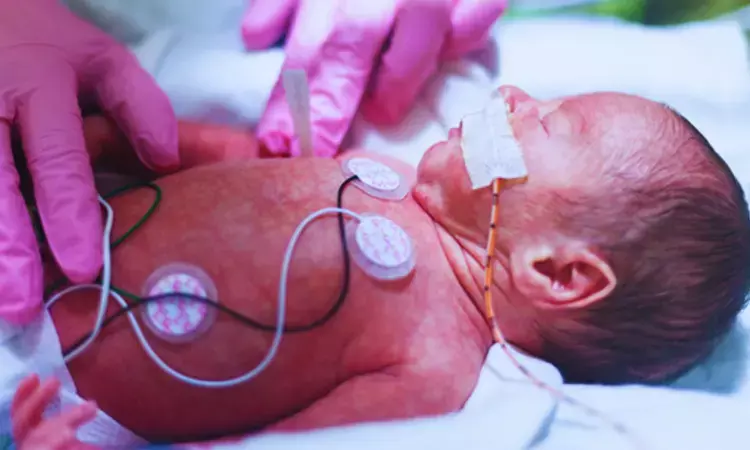- Home
- Medical news & Guidelines
- Anesthesiology
- Cardiology and CTVS
- Critical Care
- Dentistry
- Dermatology
- Diabetes and Endocrinology
- ENT
- Gastroenterology
- Medicine
- Nephrology
- Neurology
- Obstretics-Gynaecology
- Oncology
- Ophthalmology
- Orthopaedics
- Pediatrics-Neonatology
- Psychiatry
- Pulmonology
- Radiology
- Surgery
- Urology
- Laboratory Medicine
- Diet
- Nursing
- Paramedical
- Physiotherapy
- Health news
- Fact Check
- Bone Health Fact Check
- Brain Health Fact Check
- Cancer Related Fact Check
- Child Care Fact Check
- Dental and oral health fact check
- Diabetes and metabolic health fact check
- Diet and Nutrition Fact Check
- Eye and ENT Care Fact Check
- Fitness fact check
- Gut health fact check
- Heart health fact check
- Kidney health fact check
- Medical education fact check
- Men's health fact check
- Respiratory fact check
- Skin and hair care fact check
- Vaccine and Immunization fact check
- Women's health fact check
- AYUSH
- State News
- Andaman and Nicobar Islands
- Andhra Pradesh
- Arunachal Pradesh
- Assam
- Bihar
- Chandigarh
- Chattisgarh
- Dadra and Nagar Haveli
- Daman and Diu
- Delhi
- Goa
- Gujarat
- Haryana
- Himachal Pradesh
- Jammu & Kashmir
- Jharkhand
- Karnataka
- Kerala
- Ladakh
- Lakshadweep
- Madhya Pradesh
- Maharashtra
- Manipur
- Meghalaya
- Mizoram
- Nagaland
- Odisha
- Puducherry
- Punjab
- Rajasthan
- Sikkim
- Tamil Nadu
- Telangana
- Tripura
- Uttar Pradesh
- Uttrakhand
- West Bengal
- Medical Education
- Industry
Betamethasone Retreatment Restores Benefits for Severe Intraventricular Hemorrhage Among Preterm Infants: Study

USA: Researchers have found in a new study that betamethasone retreatment restores benefits for severe intraventricular hemorrhage among infants less than 28 weeks gestation.
The study, published in the American Journal of Obstetrics and Gynecology, found that betamethasone's benefits on severe intraventricular hemorrhage decline after the first dose, and a second course of treatment appears to reinstate its protective effects. Therefore, retreatment may be beneficial for sustained neuroprotection in vulnerable patients.
Antenatal corticosteroids play a crucial role in reducing the risk of severe intraventricular hemorrhage (IVH) in preterm infants. However, it remains uncertain whether their protective effects diminish over time, as seen in neonatal respiratory distress, and whether a second course of betamethasone can restore these benefits.
Previous randomized trials on betamethasone retreatment did not show a significant reduction in severe IVH rates. However, these studies may not have included a sufficient number of extremely preterm infants, who are at the highest risk. Severe IVH predominantly affects infants born before 28 weeks of gestation, yet only a small proportion (7% on average) of participants in these trials fell into this category.
Ronald I. Clyman, Department of Pediatrics, University of California San Francisco, San Francisco, CA, and colleagues aimed to address these gaps by evaluating whether the risk of severe IVH increases when the interval between betamethasone administration and delivery exceeds nine days. Additionally, they examined whether retreatment before delivery could lower the incidence of severe IVH in infants born before 28 weeks.
For this purpose, the researchers conducted an observational study to assess the incidence of intraventricular hemorrhage (IVH) before and after a practice change that encouraged obstetricians to retreat high-risk pregnancies if more than nine days had passed since the first betamethasone dose. They analyzed data from 410 infants born before 28 weeks of gestation, comparing IVH rates between those delivered within 1 to 9 days of the initial betamethasone course (n=290) and those delivered after 10 or more days, who were eligible for retreatment (n=120). Multivariable analyses using logistic regression helped evaluate the impact of this approach on IVH rates.
The key findings of the study were as follows:
- Infants delivered 10 or more days after a single betamethasone course had a higher risk of severe intraventricular hemorrhage (IVH) or IVH-related death within four days compared to those delivered within 1 to 9 days (odds ratio: 2.8).
- Among the 120 infants delivered after 10 or more days, 53% (n=64) received a second course of betamethasone.
- The rate of severe IVH in infants whose mothers received a second course was similar to those delivered within 1 to 9 days and significantly lower than in those delivered after 10 or more days without retreatment (odds ratio: 0.10).
- After the guideline change, the rate of betamethasone retreatment in infants delivered 10 or more days after the first dose (but before 28 weeks) increased from 25% to 87%.
- Following the increased retreatment, the severe IVH rate in this group dropped from 22% to 0%.
- In contrast, severe IVH rates remained unchanged (12% to 11%) in infants delivered within 1 to 9 days who were not eligible for retreatment.
The study revealed that betamethasone's protective effect against severe intraventricular hemorrhage diminishes overtime after the first dose. However, retreatment with a second course appears to restore this benefit.
"Encouraging timely retreatment in high-risk pregnancies before 28 weeks of gestation was linked to a significant reduction in severe IVH rates, highlighting the importance of optimizing antenatal corticosteroid strategies for better neonatal outcomes," the authors concluded.
Reference:
Clyman, R. I., Rosenstein, M. G., Liebowitz, M. C., Rogers, E. E., Kramer, K. P., & Hills, N. K. (2025). Betamethasone treatment-to-delivery interval, retreatment, and severe intraventricular hemorrhage in infants <28 weeks gestation. American Journal of Obstetrics and Gynecology, 232(4), 400.e1-400.e10. https://doi.org/10.1016/j.ajog.2024.06.048
Dr Kamal Kant Kohli-MBBS, DTCD- a chest specialist with more than 30 years of practice and a flair for writing clinical articles, Dr Kamal Kant Kohli joined Medical Dialogues as a Chief Editor of Medical News. Besides writing articles, as an editor, he proofreads and verifies all the medical content published on Medical Dialogues including those coming from journals, studies,medical conferences,guidelines etc. Email: drkohli@medicaldialogues.in. Contact no. 011-43720751


